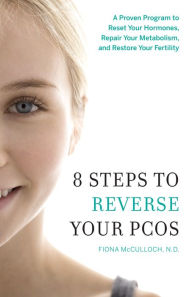It is estimated that PCOS, Polycystic Ovary Syndrome, also known as Stein-Leventhal Syndrome, affects an estimated 5-10% of women of childbearing age and more than half of them are undiagnosed. To put it into numbers, an estimated 7 million women and adolescent girls are affected by PCOS, according to the PCOS Foundation. This common hormonal endocrine disorder is responsible for 70% of fertility issues and has been linked to an increased risk for type 2 diabetes, insulin resistance, high blood pressure and cholesterol and heart disease. Women with PCOS may experience irregular periods, amenorrhea, weight gain and obesity. Other symptoms may include acne, thinning hair, pelvic pain, increased stress levels, depression and excess hair growth on the face and body. In other words, PCOS is a multi-symptom syndrome in which symptoms, including the severity of those symptoms, may vary from woman to woman. It is important to note that the ramifications of PCOS affect not only women of childbearing age but women of all ages. While it may be more difficult to diagnose in postmenopausal women, PCOS may contribute to weight gain, insulin resistance, diabetes and cardiovascular women in this age group.
Among the hallmarks of PCOS are the absence of menstruation or irregular periods and excess androgens, including DHEA and testosterone which can cause acne, male pattern baldness and excess facial and body hair. The name PCOS is a controversial one because some medical experts do not require a woman to have ovaries in order to be diagnosed with the disorder. Others say that polycystic ovaries, seen via ultrasound, are a criteria for diagnosis.
If you think you may have PCOS, see your doctor for a checkup which may include a physical examination, blood tests to measure hormone levels and a pelvic ultrasound. If you are diagnosed with PCOS, treatment may include birth control pills to regulate your menstrual cycle and, if you’re trying to become pregnant, drugs to help you ovulate.

PCOS is a complicated and often misunderstood syndrome that may be difficult to treat. Fiona McCulloch, a naturopathic doctor, has written a comprehensive book called 8 Steps to Reverse Your PCOS: A Proven Program to Reset Your Hormones, Repair Your Metabolism and Restore Your Fertility. In her book, Dr. McCulloch dives deep into the science underlying PCOS and discusses the key health factors that must be addressed in order to reverse the syndrome. The book includes symptoms checklists, quizzes, suggested lab tests about which to talk to your doctor and tools to help you control the symptoms of PCOS including recipes, a list of herbal supplements and a Food Insulin Index to help you monitor the amount of insulin in your diet. In addition, Dr. McCulloch discusses environmental factors that may contribute to PCOS and ways to avoid them.
About the Author

Dr. McCulloch, N.D., founder and owner of White Lotus Integrated Medicine, is a naturopath practitioner who, for the past fifteen years, has worked with thousands of patients who are seeking better health. She is a data-junkie who specializes in evidence-based therapies for PCOS, thyroid health, autoimmunity, weight management and infertility among other conditions. Dr. McCulloch is also a medical advisor for IVF.ca: Canada’s premier fertility community and is on the medical advisory for the PCOS Awareness Association. As a woman with PCOS herself, she is dedicated to increasing both awareness and research of this condition. Her new book, 8 Steps to Reverse Your PCOS, is available at all fine booksellers or you can get it below from Amazon.com.
YOU MAY ALSO LIKE:
No Time to Exercise Because You Work Too Much? Get a DeskCycle!
Tips to Break a Weight Loss Plateau